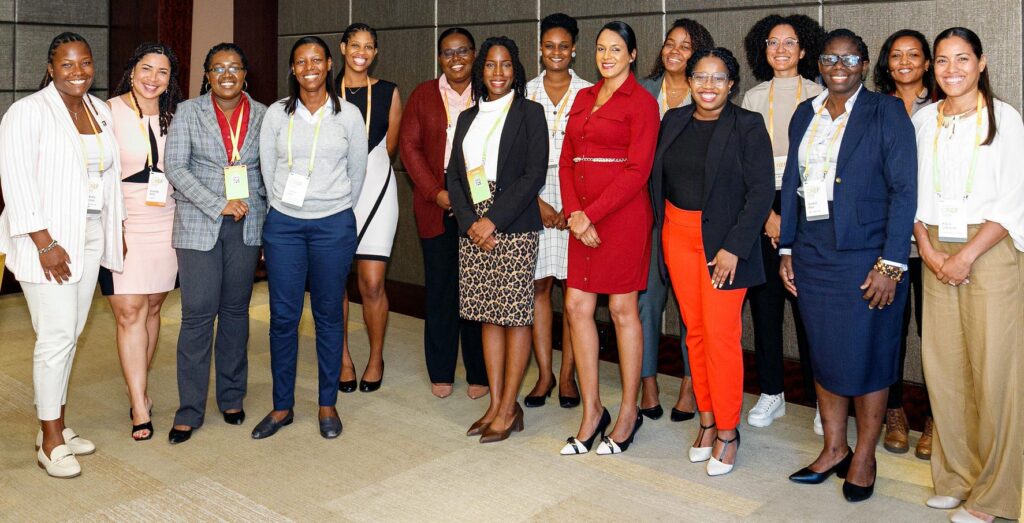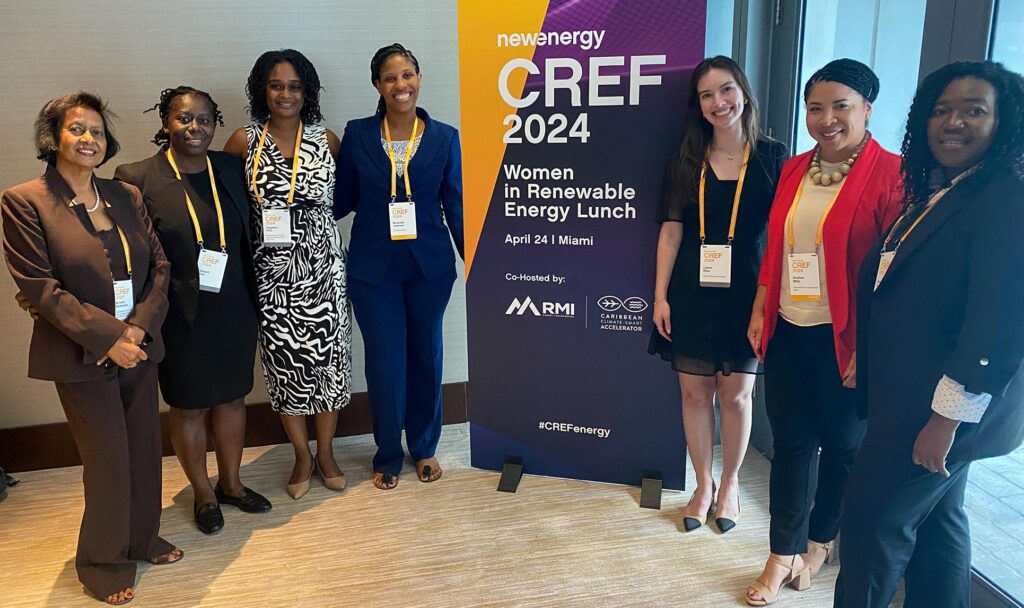Laura Diez: Championing Island Communities and Gender Equity
This RMI senior associate draws inspiration from her upbringing to foster lasting change.
Laura Diez grew up in the heart of Miami amid the fabric of two cultures. Her parents, who had immigrated from Cuba in one of the earliest waves of boatlift migration, planted roots in South Florida. Determined to keep their family’s Cuban heritage alive, her maternal grandparents became pillars of support for the immigrant community. In the late 1960’s, Diez’s grandmother opened a clothing factory to employ dozens of Cuban women — a modest space that bridged livelihood and belonging. It was here, amid the hum of sewing machines and the chatter of her grandmother’s protégés, that Diez spent countless childhood hours. In this unlikely classroom, she absorbed profound lessons about connection and unity that shaped her understanding of building community.

Diez visiting the St. Lucia Electricity Services Limited (LUCELEC) 3MW Solar Farm in in La Tourney, Vieux Fort, Saint Lucia, 2024.
Carrying on lessons from her grandmother, Diez brings a community-centered approach to her work with the RMI Islands Energy Program where she serves as a senior associate. She came to RMI due to her interest in the environment. “My first academic love was evolution,” Diez says. “I love little microevolution events like subspecies of certain animals…and the reason that subspecies come up is because a lot of the time their environments are changing, their boundaries are changing, or food sources. So that got me thinking a lot about climate change.” That led Diez to pursue a master’s degree in climate science and solutions. She then worked as the sustainability coordinator for a county government in Georgia before joining RMI.
Diez takes pride in RMI’s approach that is distinct from the traditional “fly in, fly out” model which leaves communities ill-equipped for sustaining change. Instead, her team digs deeper. Working with an array of partners, the program brings key leaders to the table, forges connections, and invests in workforce development. This model, Diez believes, lays the groundwork for lasting transformation.

Diez and RMI colleagues at the LUCELEC utility solar site, 2024.
“Something that I’ve found people really take to heart [at RMI] is that our goal should be to work ourselves out of a job. And that’s intimidating to say… [because] it means transferring knowledge as much as possible. It means building local capacity. It means really investing in the people on the ground.”
Something that I’ve found people really take to heart [at RMI] is that our goal should be to work ourselves out of a job… It means really investing in the people on the ground.
Uplifting Gender Equity
Diez’s mission to boost local capacity puts a spotlight on women. Recent United Nations figures suggest that women and children account for 80 percent of climate refugees, and, in most households, women are the primary consumers of energy. “They are the people using energy in the home, they’re doing the cooking, they’re choosing the products that they’re buying.” says Diez. “It’s really unfortunate to think that while women are the most impacted and the folks most reliant on clean energy, they are also not being involved in solutions around it.”
Beyond the disproportionate climate burdens that women experience globally, women like Diez face additional challenges when aspiring to leadership roles in the energy transition. The clean energy sector remains predominantly male-dominated, with women accounting for just 32 percent of the workforce across all levels, from executive positions to technical roles. Various factors contribute to a cycle that hinders women’s ability to enter, remain, and thrive in this field. Providing them with access to training and mentorship can help reduce these inequalities, advance their careers in the energy sector, and prepare them for leadership roles.
It’s really unfortunate to think that while women are the most impacted and the folks most reliant on clean energy, they are also not being involved in solutions around it.
Women As Agents of Change
The Caribbean’s energy sector is notably lacking in gender diversity. As these island nations embark on ambitious clean energy transitions, unlocking the full potential of this transformation demands innovative approaches and fresh business models. To achieve this, greater involvement from a diverse range of talent is essential. RMI’s Caribbean-based Women in Renewable Energy (WIRE) Network advocates for expanded gender representation in C-suites and boards, through ensuring a pipeline of motivated and experienced women.

The WIRE Mentorship Program cohort 2022–2024 at the Caribbean Renewable Energy Forum in Miami, 2024.
“There is a ‘leaky pipeline,’ where women leave their roles mid-career because they don’t see shared identities represented in leadership,” Diez says. She acknowledges the broader cultural and systemic challenges that inform this pipeline, sharing stories of qualified women being passed over for projects due to false assumptions about family planning.
Diez sees WIRE’s approach as two-pronged: developing skills and building networks. She recognizes that skills alone aren’t always enough, so the network also aims to change the industry landscape by increasing the number of women leaders and fostering supportive professional relationships. Mentorship is central to WIRE’s model. The flagship program invites 12 women each year to participate in a two-year program. In the second year, they transition to becoming mentors themselves, creating a cohort that pairs seasoned leaders with up-and-coming professionals.

Diez (third from right) with members of the WIRE Mentorship Program at the annual WIRE-hosted Women in Renewable Energy Luncheon at the Caribbean Renewable Energy Forum in Miami, 2024.
The cohort meets in-person once per year to conduct site visits and present their final call-to-action. “The call to action is ideally some sort of community-based project where you are sharing something about your experience in the renewable energy space,” explains Diez. She has seen projects ranging from trainings on gender in the workplace, to children’s books, to career fairs. The scale and focus of WIRE final products vary greatly, but they’re typically designed to address issues close to the participants’ hearts and relevant to their local communities.
Beyond RMI: Personal Endeavors and Storytelling
Stories have the power to make climate change personal by connecting with shared experiences and values. Diez believes that storytelling plays a crucial role in driving the energy transition, bridging the gap between the public and those on the frontlines. Inspired by the urgent need for more climate communicators, she created the “Eco-Chic” podcast to explore eco-conscious lifestyles. “Eco Chic began as a science-forward show but gradually evolved to more of a personal exploration of topics I was interested in,” she says. She has hosted big names like Katharine Hayhoe and Erin Brockovich, tackling a range of topics from sustainable fashion to environmental justice and activist burnout.


Diez recording “Eco Chic” at podcast studios in Los Angeles, CA, 2024.
“Storytelling allows you to better understand what someone has lived through, why someone cares about something, [and] the context that climate is showing up in their life,” Diez notes. She celebrates the notable shift in the climate conversation in recent years: where once the focus was convincing the public that climate change was real, now the dialogue has shifted to addressing its impacts. In this context, her show creates a space for empathy and understanding, making the abstract concept of climate change more tangible and relatable to listeners.
I think my work at RMI has given me a lot of motivation because I work with communities… having so many community-facing experiences really gives me a lot of hope.
For Diez, storytelling isn’t just about the present — it’s a tool to imagine a brighter future for island communities in her work. This vision, centered on resilience and energy independence, keeps her going when the fight for change gets tough. “I think my work at RMI has given me a lot of motivation because I work with communities. I like being able to see the impacts of something. We joke a lot, especially in capacity development, that for a long time you don’t know if you’ve impacted a region or an organization. Measuring success can be very hard in this role. But having so many community-facing experiences really gives me a lot of hope.”